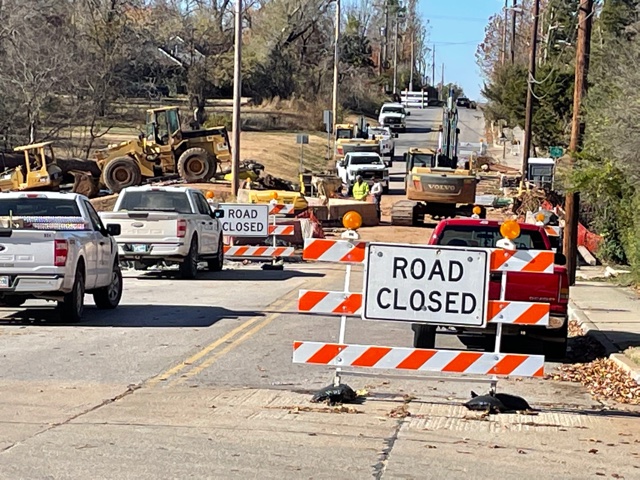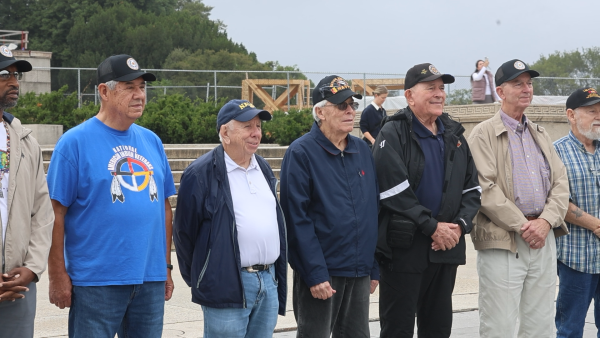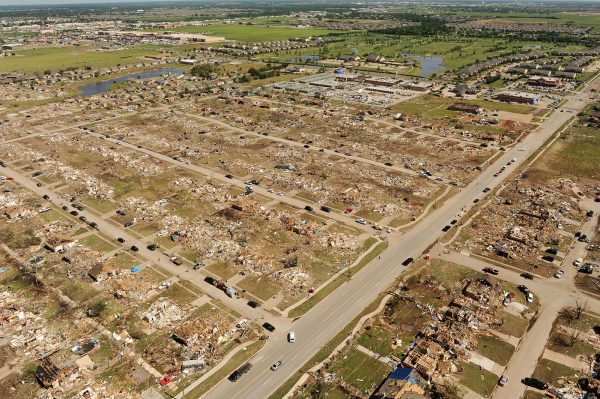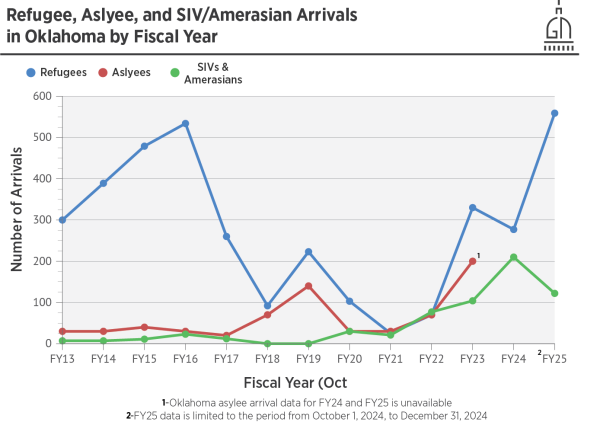Oklahoma municipal and tribal officials say infrastructure money is needed
Work continues on the Imhoff Road bridge in Norman that was closed July 29 after structural issues were discovered during an inspection. It is expected to reopen in early 2022. Gaylord News Photo.
WASHINGTON — Mayors and tribes across Oklahoma have lists miles long of projects they hope to fund with some of the more than $5 billion that has been unlocked for Oklahoma by the federal Infrastructure Bill.
The $1.2 trillion infrastructure package signed into law on Nov. 16 authorizes spending to fix crumbling roads and bridges, expand broadband, and fund clean energy, transit, and other public works over five years. Native American and Alaskan tribes will receive $11 billion from the package, from which $3.5 billion will go to the Indian Health Service agency.
The state and municipalities will receive about $4.6 billion for roads and bridges, $520 million for water infrastructure projects, nearly $500 million for airport and public transportation and more than $100 million to improve internet access for the 1.12 million low-income Oklahomans, according to the White House.
Despite the substantial bipartisan support the legislation received in the Senate and to a lesser degree in the House, every member of the Oklahoma congressional delegation voted against the bill.
Major cities and tribes across the state said they have large needs for the cash that will become available as a result of the legislation.
“We have stormwater needs because we’re the largest city in the state of Oklahoma not to have a stormwater utility because we’re the only city in the state that has to vote on the creation or raising of the utility, so having funds to address gaps in that area will be fantastic,” said Norman Mayor Breea Clark.
Clark said three Norman bridges have failed in the past five years, and her office is excited about infrastructure money going toward bridge and road repairs because the city is behind in their maintenance.
The city has an important project at 36th Avenue NW that was supposed to receive federal funding, she said. Clark said the city has matching money from a general obligation bond voted on by Norman residents waiting to be combined with federal funds to complete the project.
According to the city’s website, the project involves widening 36th Ave NW from north of Tecumseh Road to north of Indian Hills Road from two to four lanes, with five-foot-wide on-street bike lanes.
“This project has a high chance of moving forward and finally being completed because of the progress we’ve already made, and hopefully, the infrastructure bill will fill that gap and get it over the finish line. So this is very important in Norman, and we should be able to act on it immediately,” she said.
Jerald Gilbert, Enid’s city manager, said the city is very excited about the prospect of additional infrastructure funding to fix the city’s aging and insufficient infrastructure.
“Roads, streets, and bridges are a huge need for us in Enid. Water and sewer lines are another exciting possibilities. Just about any infrastructure that you could imagine, requires repairs, replacements, or improvements,” he said.
Oklahoma City Mayor David Holt said he is very interested in money for roads and bridges and the city’s transit dollars.
“We’re a city built around the automobile, but in the last couple of decades, our residents are wanting to see public transit alternatives and prioritize more money in that bucket to partner with some of the things we’re already doing,” Holt said.
Holt said Oklahoma City is building its first bus rapid transit line between Classen Boulevard and Northwest Expressway, two important medical and commercial areas.
The other thing he looks forward to, Holt said, is Amtrak’s promise to use infrastructure money to connect Oklahoma City to southern Kansas.
“If you look at the Amtrak map across the country, the Heartland Flyer comes up from Fort Worth and ends here in Oklahoma City, so funding in the bipartisan bill for passenger rail would potentially link us up to Newton, Kansas, which is a northern suburb of Wichita, making the whole Amtrak network more available to our residents,” he said.
Holt acknowledged that projects funded by the infrastructure bill would take years to complete, and future mayors would probably “cut the ribbons” when they are finished.
He said the relocation of Interstate 40 near downtown is an example of a major infrastructure project. The project was first conceived in the 1990s, and he cut the ribbon 25 years later.
“When I talk about these things, and the benefits I see for Oklahoma City, I also recognize we’re talking about years to award these dollars and years beyond that to begin construction,” Holt said.
Lawton Mayor Stan Booker said “We have a lot of water-sewer infrastructure that we’re hoping can be advanced with infrastructure money, and also some industrial roadwork; those are roads used for industrial traffic.
“So, those are the main areas we could benefit from the most, industrial infrastructure and water-sewer infrastructure,” Booker said.
Randy Sachs, a spokesman for the Choctaw Nation, said infrastructure money will allow the Nation to make intergenerational infrastructural investments in broadband expansion, road construction and surface improvements, electrification and power generation, and many other things.
“The Infrastructure Investment and Jobs Act are historical and incredibly large. Because of this, the transfer of funds could be slow, and implementation could be even slower. Federal agencies and departments will likely hold numerous consultations and listening sessions and accept written and oral comments to fully understand the needs and desires of tribal governments before distributing these funds,” Sachs said.
It will also allow them, he said, to continue to care for their environment, which they believe is one of the primary responsibilities of tribal communities.
“The Choctaw Nation is grateful to the Biden Administration and our allies in Congress for ensuring Indian Country was not forgotten during the drafting of this important legislation,” he said.
Gaylord News is a reporting project of the University of Oklahoma Gaylord College of Journalism and Mass Communication. For more stories from Gaylord News visit GaylordNews.net.

[email protected]
https://twitter.com/robertlovnews
https://www.linkedin.com/in/robert-loayza-2217911b5






